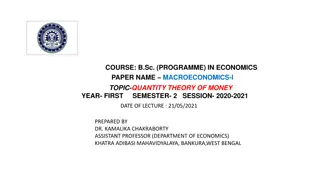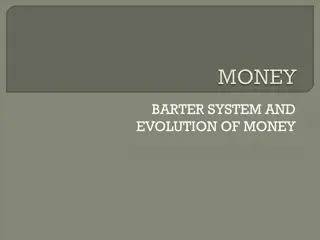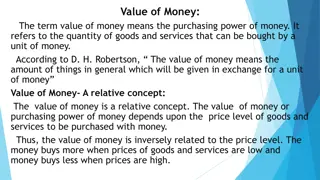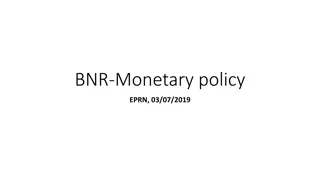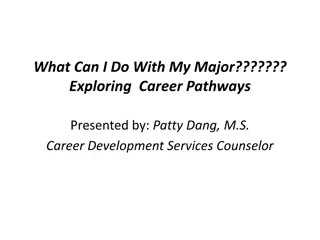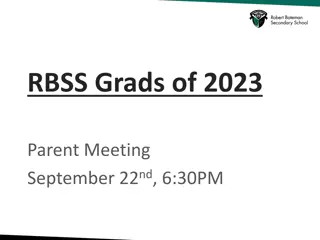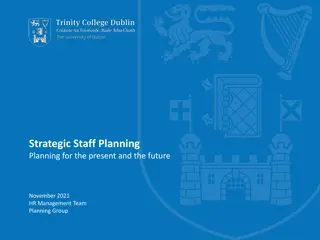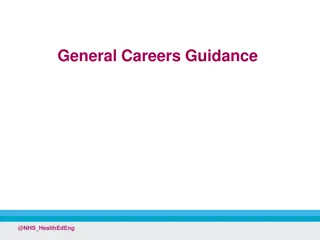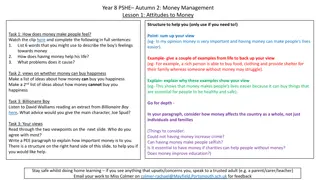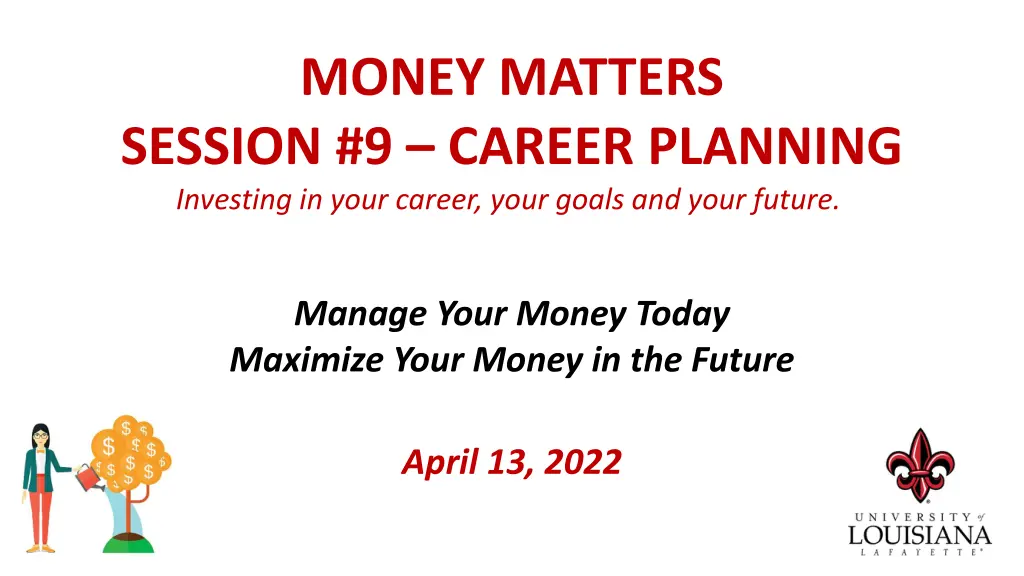
Financial Planning for Your Future
"Explore career planning, investing, and financial strategies to secure your future in a changing economic landscape. Stay informed with economic predictions and current events analysis to make informed decisions."
Download Presentation

Please find below an Image/Link to download the presentation.
The content on the website is provided AS IS for your information and personal use only. It may not be sold, licensed, or shared on other websites without obtaining consent from the author. If you encounter any issues during the download, it is possible that the publisher has removed the file from their server.
You are allowed to download the files provided on this website for personal or commercial use, subject to the condition that they are used lawfully. All files are the property of their respective owners.
The content on the website is provided AS IS for your information and personal use only. It may not be sold, licensed, or shared on other websites without obtaining consent from the author.
E N D
Presentation Transcript
MONEY MATTERS SESSION #9 CAREER PLANNING Investing in your career, your goals and your future. Manage Your Money Today Maximize Your Money in the Future April 13, 2022
Owning Your Financial Future: Spring 2022 FINANCIAL PLANNING FOR INTERNATIONAL STUDENTS Today, January 19 TAX PLANNING Wednesday, February 9 DEBT & STUDENT LOAN MANAGEMENT Tuesday, March 15 INVESTING Wednesday, March 30 CAREER PLANNING & FINANCIAL PLANNING Wednesday, April 13
Owning Your Financial Future YOUR VALUES YOUR GOALS Education Career Family FINANCIAL STRATEGIES Taxes, Insurance & Other Debt Income & Expense Management Investing Management
Owning Your Financial Future YOUR VALUES YOUR GOALS Education Career Family FINANCIAL STRATEGIES Taxes, Insurance & Other Debt Income & Expense Management Investing Management
Brians Economic Predictions for 2022 Inflation is at a 40-year high. It s at 8.5% now. My best case estimate is for it to be at 5% in 12 months. It could be 12%. Interest rates are going up. This will affect future borrowing costs. Interest rates on savings accounts are the last to go up when rates increase. The Russian invasion of Ukraine will continue to cause economic turbulence through the year. Turbulence = Uncertainty, disruption to supply chains, shocks out of nowhere. The job market will continue to be very strong. Salaries for college graduates are at all-time highs. I expect this to continue. But, there will be unexpected shocks as companies try to figure out how to do business in 2022.
Some Current Events News Can you expect further extensions in the future? Can you expect any debt forgiveness in the future? I would not plan on either. Plan for the worst, hope for the best.
Brians Economic Predictions for 2022 Inflation is at a 40-year high. It s at 8.5% now. My best case estimate is for it to be at 5% in 12 months. It could be 12%. Interest rates are going up. This will affect future borrowing costs. Interest rates on savings accounts are the last to go up when rates increase. The Russian invasion of Ukraine will continue to cause economic turbulence through the year. Turbulence = Uncertainty, disruption to supply chains, shocks out of nowhere. The job market will continue to be very strong. Salaries for college graduates are at all-time highs. I expect this to continue. But, there will be unexpected shocks as companies try to figure out how to do business in 2022. PLAN AHEAD
Todays Agenda Some strategies for career planning Getting started Different investment options The importance of investing Some career planning & investing advice from all of us More questions from you
Why Are You Here? Take a few seconds to ask yourself these 2 questions: Why Are You in Graduate School? What will you be doing in 5 years?
Why Are You Here? Why do I think you are here? I think you are here to think about your financial situation. I think you are here to begin developing a financial plan. I think you are here today to gain better control over your income and expenses to help you: (1) Eliminate some stress associated with being a grad student. (2) Maximize your goals over the long-term.
Why Are You Here? Why do I think you are here? I think you are in graduate school to leave to transition to a better career and life and future for yourself. I think of graduate school as more purpose-focused than your undergraduate experience. I want you to be in a better career situation when you leave UL Lafayette than you would have been without your graduate degree.
Some General Career Planning Advice #1 What jobs should you be applying for? All of them all that interest you. Do NOT filter yourself out of the job search. If you are interested in a job but aren t sure if you re qualified, apply for that job. Let them decide. Many job announcements are aspirational. In reality, recruiters may be happy if they find someone who meets 75% of the qualifications. Always assume that you are the one making the decision. Assume that you are interviewing the company as much as they are interviewing you.
Some General Career Planning Advice #2 What should you look for in a job? Consider all of the financial & non-financial rewards. What are non-financial rewards (or, non-salary rewards): Location, culture, family, expectations Will the company pay for your training or certification? Consider all benefits health care, retirement, tuition forgiveness Consider the short-term and the long-term. Should you work for a high-profile, high-stress firm for 2 years to build your resume? What opportunities does this job prepare you for? Whatever you do, have a plan for how this job fits into your long-term career
Some General Career Planning Advice #3 Should I negotiate my salary? If so, how? YES!!! You should all always negotiate your salary. There is never any harm in asking for 5-10% more salary Asking for 15%+ might begin to get risky but you have to ask for what you re worth. You can figure out what you re worth by asking anyone and everyone what you should be earning. I have had 4 academic jobs. Each time, I was told in the interviewing process that they did not negotiate salary. Each time, I asked for more salary. 3 out of 4 times I got more salary. You can negotiate anything not just salary. Everyone: Time-off, vacation, work-from-home, continuing education Academics: Lab-funding, course load, summer pay, travel money
Some General Career Planning Advice #3 Should I negotiate my salary? If so, how? Remember that there will be multiple people or divisions responsible for structuring your hiring package: Human Resources: Responsible for following rules and policies and taking care of the process Your Future Boss: Responsible for hiring you to make the firm or institution better By identifying who is in charge in the process and who has the power, you can determine with whom you should be negotiating.
Some General Career Planning Advice #4 How do I get the company to notice me? If you are applying for an industry job, assume the first review of your resume will be done by a computer Make sure your application is complete Make sure your application is easily searchable Use keywords, both for the power verbs and the accomplishments Write a relevant cover letter. My standard cover letter might have 8 paragraphs in it. 5 of these would always be the same, 3 would be (minimally) tailored to the company. Keep your cover letter to less than 2 pages. Use your contacts .use your faculty s contacts. The processes generally ensure that every application is treated equally at least first Once you make the first cut, a simple email from your contacts to the recruiting committee can simply serve as a be on the lookout for this application notice.
Some General Career Planning Advice A current example: We are looking to hire an assistant professor of Economics & Finance right now like, I m doing 6 hours of Zoom interviews today. Human Resources receives and makes sure each application is complete. We have a committee of 5 to make the decisions. We had 60 applicants in the 2 weeks since we posted the position. We narrowed the list down to 12 Zoom finalists. 1 has already accepted an offer in the past 2 weeks. I read every cover letter and every CV. I did not look at a single GPA. Today s Zoom interviews are 20 minutes each. I don t care what they re wearing. I m not flattered if they compliment me. I want them to own their work and convince me that we should make them an offer. We will invite 2-4 to campus for 1-2 day interviews, probably. We will make 1 an offer, hopefully, within 5 weeks of posting the position.
Happiness Short-Term Goals Long-Term Goals Family Needs Financial Needs
How Will Your Career Choices Impact Your Financial Planning?
Career Planning Overview What Type of Career Will You Have? Something structured, with an employer, with benefits and a boss and a desk Something unstructured consulting, performing, freelance, entrepreneurship Industry Academia
Career Planning Overview Something structured, with an employer, with benefits and a boss and a desk Academia Industry You will have to pick a retirement plan. You will have to pick a health care plan. If you re tenure-track, you will have a clear timeline with lots of risk. You may NOT have flexibility in where you live. Your salary may be 50% - or less- than what it could be in industry. You might not get paid for 2-3 months in summer. You may have lots of time flexibility, allowing you to kind of be your own boss and pursue other opportunities (e.g. consulting). You will have to pick a retirement plan. You will have to pick a health care plan. You will have (relatively) clear promotion and salary plans. You may have flexibility in who you work for. You may have flexibility in where you live. But that may be the only flexibility you have. Your boss may be a jerk and you may have to work you tail off to keep your job.
Career Planning Overview Academia Administration (Some Generic Thoughts) Tenure-Track Faculty (Some Generic Thoughts)
Career Planning Overview Academia Tenure-Track Faculty (Some Generic Thoughts) Typically a 9-10 month salary. No cash during summer unless you teach or get income through grants. Research is your currency every extra class you teach compromises your research. You need to show progress towards tenure during your first 3 years and your job is safe. Typically need to go up for tenure during your 6th year (with possible extensions for maternity or other unique situations). If you get tenure, you have job security for life. If you are denied tenure, you have 0-1 years to find a new job and home. Your first salary is your most important Because you cannot expect lots of raises or bonuses. You may get raises of 5-10% when you get promoted but you may only get promoted twice in your life. Your first salary is very, very important.
Career Planning Overview Academia Administration (Some Generic Thoughts) Typically a 12-month salary. Job security is based on performance there is no tenure (unless you move into administration after already earning tenure). Job security may be based on budgets. Promotions and raises are possible. Switching jobs, divisions or offices might be the way to get promotions and raises.
Career Planning Overview Something unstructured consulting, performing, freelance, entrepreneurship You will have to pay for a health care plan. You will have to create your own retirement plan. You may have loads of flexibility in where you live, when you work, what work you do. You may have to learn way more about tax and employment law than you really want to do. You have close to zero income reliability at least initially. You may have to become a professional hustler.
Past Questions From You #1a How early should I be career planning? How much of my time can I expect to spend career planning?
Past Questions From You #1b What if I'm interested in a unique non-academic career, can I find assistance with something like that at UL? Is there anyone other than my advisor that I can reach out to in regards to career planning?
Past Questions From You #2 What would I do if I found out that my career isn't the one for me? For example Given the downturn in the oil and gas industry which has been a major employer of many geoscientists in the past decade, I really don't know the pathway to follow with a degree in geology as employment in the field has really been on the decline. How and when do I know that I need to make a career change or transition?
Past Questions From You #3 I have a really good job offer in Boston and an okay job offer in New Orleans. My partner will be in grad school for 2 more years in Louisiana. Eventually we want to settle in or near Louisiana. What should I do?
Past Questions From You #3 I have a really good job offer in Boston and an okay job offer in New Orleans. My partner will be in grad school for 2 more years in Louisiana. Eventually we want to settle in or near Louisiana. What should I do? Only you can answer this. Focus on your goals, focus on your priorities. You can make lists and spreadsheets and you can calculate the estimated financial value of each option. But ultimately this is a personal decision that only you and your family can answer. How much of the short-term are you willing to sacrifice for the long-term?
Past Questions From You #4 I am graduating with my Master of Architecture. I have an opportunity to take a job in the Northeast with a really reputable firm that will take great care of me and pay for all of my continuing education and certifications over the next 3-5 years. I also have an opportunity to take a job closer to home, but I will have to pay for all of my continuing education and certifications to advance my career. Eventually, I would like to open my own practice in Louisiana but that may be 5-10 years away. What should I do?
Past Questions From You #4 I am graduating with my Master of Architecture. I have an opportunity to take a job in the Northeast with a really reputable firm that will take great care of me and pay for all of my continuing education and certifications over the next 3-5 years. I also have an opportunity to take a job closer to home, but I will have to pay for all of my continuing education and certifications to advance my career. Eventually, I would like to open my own practice in Louisiana but that may be 5-10 years away. What should I do? Again Only you can answer this. Focus on your goals, focus on your priorities. You can make lists and spreadsheets and you can calculate the estimated financial value of each option. But ultimately this is a personal decision that only you and your partner can answer. How much of the short-term are you willing to sacrifice for the long-term?
Questions From You #3 and #4 Decisions about jobs and careers are very personal. They are classic trade-offs between short-term and long-term goals. They are typically about more than just you talk to your family. How to decide?
Questions From You #3 and #4 How to decide? Try this trick: Fully commit to one option to yourself. Tell yourself you re doing Option #1 and try to forget about Option #2. And then pretend to live it and make plans for it like, literally make plans. Map out the next 10 years of your life with this decision. You can use some numbers, but it will be mostly about values, goals and priorities. Pretend that you have made this decision for 2-3 weeks.
Questions From You #3 and #4 Pretend that you have made this decision for 2-3 weeks. And then assess how you feel. Are you more or less excited? Are you more or less anxious? Does the 10-year plan make sense? Its it clear? How have you been sleeping these past 2-3 weeks? If necessary, repeat this commit-and-pretend process with the other option to try to get a better sense of how both your head and your heart respond to each option.
Past Questions From You #5 I am about to start a new job and my human resources advisor has warned me that I will have to make decisions about a company-provided retirement and health plans on my first day at work. How do I decide which plans I want? What if I choose the wrong plan can I change my decision later?
Past Questions From You #5 I am about to start a new job and my human resources advisor has warned me that I will have to make decisions about a company-provided retirement and health plans on my first day at work. How do I decide which plan I want? What if I choose the wrong plan can I change my decision later? Let s start with the health-care plan: You generally can select which plan option you choose once a year. The company will deduct pre-tax salary for your premium (and the company will also contribute to the premium to share the costs) Your family members may or may not be included. And there are lots of financial decisions you will have to make
Past Questions From You #5 Let s start with the health-care plan: And there are lots of financial decisions you will have to make Choose to pay a higher monthly premium to get a lower annual deductible. What are the annual and lifetime out-of-pocket maximums? What are the co-payment amounts you pay for each visit? Think about which medical services YOU are most likely to need. Health Savings Accounts (HSA) You can contribute pre-tax dollars to an HSA to be used to pay co-pays, deductibles, other expenses The money in the account can roll-over from year to year Requires you to be part of a high-deductible health care plan Flexible Spending Account (FSA) You can contribute pre-tax dollars to an FSA to be used to pay co-pays, deductibles, other expenses The money in the account DOES NOT roll-over from year to year DOES NOT require you to be part of a high-deductible health care plan
Past Questions From You #5 I am about to start a new job and my human resources advisor has warned me that I will have to make decisions about a company-provided retirement and health plans on my first day at work. How do I decide which plan I want? What if I choose the wrong plan can I change my decision later? Let s now talk about the retirement plan: If you re lucky, your employer will offer you the choice of a defined benefit plan (aka pension ) or a defined contribution plan (401(k), 403(b). 50 years ago, most employers only offered a pension. Today, most employers only offer a defined contribution plan. For a pension, the most important word is vesting For a defined contribution plan, the 2 most important words are vesting and matching
Past Questions From You #5 Let s now talk about the retirement plan: For a pension, the most important word is vesting The company will offer a payment upon reaching retirement age. This payment will be calculated based on some pre-determined formula. Example: 2% of your salary x The number of years you worked for the company The company may require you to contribute a portion of your salary into the plan And then the company is responsible for managing the investments to make sure it has enough money saved to make all of the required pension payments Why is vesting the most important word with pension plans? The plan will dictate how long you must be in the plan (and contributing) before you are eligible for retirement benefits. This length of time is vesting. If you leave the company before your benefits have fully vested, then you receive 0.00% of those benefits. If you leave the company 1 day after your benefits have fully vested, then you receive 100.00% of the promised benefits.
Past Questions From You #5 For a 401(k) or 403(b), the most important words are vesting and matching Vesting is generally the same as with a pension plan when you receive benefits, kind of. Any contributions you make into the plan are always 100% vested. They always belong to you. But if the company makes any matching contributions, they may be subject to a vesting period. If you leave the company before the matches vest, you receive 0.00% of these matched contributions. Matching is (kind of) free money from your employer. The retirement plan will specify what percentage of your salary your employer will match as a contribution into your retirement plan. It s a match because the company only contributes if you contribute first. Example: At UL Lafayette, I contribute 8% of my salary to my 403(b), the University will match with a 6% contribution. So I will end up with 14% of my salary going into a retirement plan. If I contribute 7% of my salary to my 403(b), the University will not match anything. So I will end up with 7% of my salary going into a retirement plan. Once your money is in your retirement plan, then the company will have a plan sponsor (e.g investment company) manage your account. But YOU are responsible for directing your money into a menu of investment options that the plan sponsor allows. These options will generally be mutual funds, not individual stocks, crypto, real estate, NFTs
Past Questions From You #5 Why would you want to give up some of your hard-earned paycheck today in order to put it into a retirement fund that you may not touch for 40 years? Two reasons: Matching & Tax-Deferral. We saw how a company match can effectively increase your compensation Tax-Deferral is the other big advantage of retirement plans Any money you contribute to a retirement plan today is before tax. The before tax amount will be invested. Your investments will grow at some rate of return over the long term until you retire. When you reach retirement age (generally over 60), you can begin withdrawing money from your retirement plan You will pay ordinary income taxes on these withdrawals You will never pay capital gains taxes on how much your initial investments grew
Past Questions From You #6 I m going to be a consultant and entrepreneur. Is there a way I can benefit with my own retirement plan even without an employer doing it for me? Yes. How? With an IRA, Individual Retirement Account: A traditional IRA allows you to invest $6,000 of pre-tax money into a qualified account, and then you direct where you invest the money and how it grows You cannot access the money, without fees and taxes, until retirement There are income limits to whom can participate; very high income folks cannot participate You pay ordinary income tax when you withdraw the money in retirement A Roth IRA allows you to invest $6,000 of after-tax money into a qualified account, and then you direct where you invest the money and how it grows The income limits are less than with a traditional IRA You do not pay any tax when you withdraw the money in retirement because you already paid income taxes.
Past Questions From You #5 and #6 A few concluding comments about retirement plans: If possible, set up an IRA, a Roth IRA and take the maximum advantage of whatever retirement plan options your employer offers. Why? Flexibility. If your income grows, you may make too much to get an IRA or Roth Having different accounts with different tax rules allows you to choose how you withdraw money in retirement Imagine you do some work when you re 75 that pays you $200,000. You may choose to withdraw a lot from your Roth IRA (which will be tax-free) and less from your IRA (which will be taxed) so you can avoid claiming more income in a year when you re in a high-tax bracket. Then if you take the year off when you re 76, you ll drop down to a lower tax bracket, and you may choose to withdraw a lot from your IRA and a little from your Roth IRA.
Past Questions From You #7 How do we avoid getting a lowball job offer, given we are graduating students with little leverage and fewer resources, fewer options and less information?
Past Questions From You #7 How do we avoid getting a lowball job offer, given we are graduating students with little leverage and fewer resources, fewer options and less information? The financial planning answer: If you know what your budget is and what your short- and medium- term financial goals are, you can do the math to determine what the minimum compensation you need from any job. Include goals, family & partner situations, debt repayment, insurance and finally-living-like-an-adult expenses (such as eating less rice and ramen).
Past Questions From You #7 How do we avoid getting a lowball job offer, given we are graduating students with little leverage and fewer resources, fewer options and less information? The career planning answer: Know your value. Talk to other graduates. Talk to faculty. Talk to family. If possible, talk to other people who have been hired by the same company. Do your research. Put your emotional intelligence (EQ) to work to try to determine how much leverage you have. Try to get a sense of how much they want you. In general, the higher the salary, the more they want you. In general, the more they have invested in recruiting you, the more they want you. Try to get a sense of how unique the position is. Try to get a sense of what they would do if you asked for more money Would they have to start the recruiting process over? Or is their second choice candidate simply a phone call away?
Past Questions From You #7 How do we avoid getting a lowball job offer, given we are graduating students with little leverage and fewer resources, fewer options and less information? A very little bit of personal perspective I have had 6 full-time jobs as an adult. I have asked for more salary all 6 times. I have received more salary 5 out of 6 times. Most employers will respect that you asked, even if they cannot meet your request. It suggests that you know your value or value yourself more. Know your value. Most of the people you re interviewing with have negotiated more salary in their lives, too.
Past Questions From You #7 How do we avoid getting a lowball job offer, given we are graduating students with little leverage and fewer resources, fewer options and less information? A very little bit of personal perspective They (generally) understand that giving you $2,000 or $5,000 more in salary is a small price to pay for your happiness and productivity. Maybe they cannot offer you any more salary. If not, don t be shy about trying to negotiate something else vacation days, bonus potential, discretionary budget. You have to pay your bills. And, you also want to be paid what you are worth so that you are excited about this JOB becoming your CAREER.





